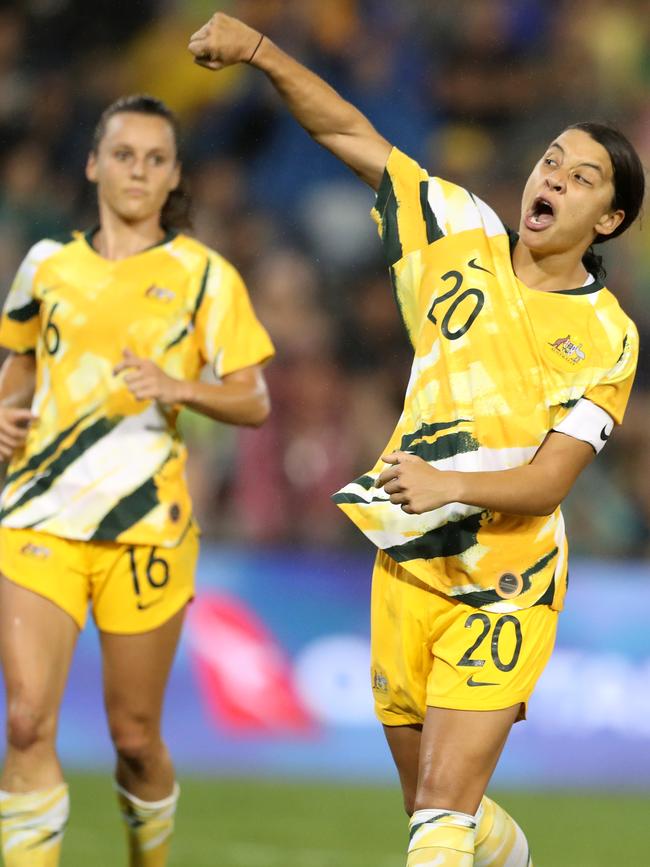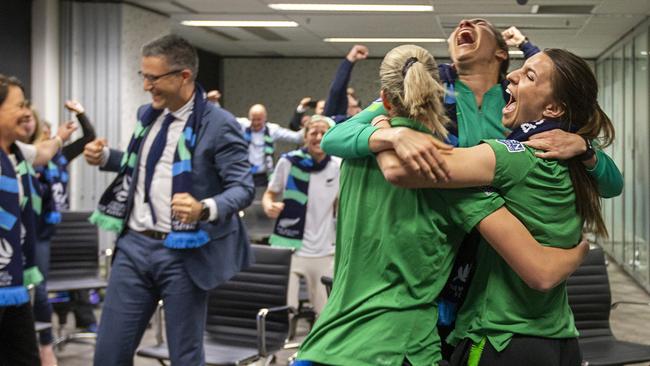World Cup dream a watershed moment for women’s sport
While for many reasons 2020 has become the year we would rather forget, the announcement that the 2023 Women’s soccer World Cup will be played right here on home soil makes this an unforgettable year for women’s sport, writes Megan Hustwaite.
Opinion
Don't miss out on the headlines from Opinion. Followed categories will be added to My News.
A year to forget for too many reasons, the opening six months of 2020 have proven a winner for Australian women’s sport enjoying a watershed moment on the global stage.
It reached a crescendo in the early hours of Friday morning when FIFA announced Australia, in partnership with New Zealand, would host the 2023 Women’s soccer World Cup.
Twitter was a flurry of tweets from Aussies who stayed up or set the alarm to watch the announcement live from Switzerland where FIFA president Gianni Infantino delivered the news that the trans-Tasman bid was a success, netting 22 votes to Columbia’s 13.
The celebrations that followed rivalled a sensational Sam Kerr goal. Footage of Matildas players and Football Federation Australia officials were full of emotion, their faces and embraces a mix of elation and relief. Even the Opera House embraced the colour and excitement, lit up with imagery of our world game stars.
Just months earlier, Australia won the right to host the 2022 FIBA Women’s World Cup.

Our Opals basketballers are ranked No.2 in the world behind powerhouse USA and will strive for a history-making gold medal at next year’s Tokyo Olympics with Victorians Liz Cambage, Rebecca Allen and Ezi Magbegor flying the flag. The Opals have claimed five Olympic medals, in contrast to their male counterparts who are yet to win a place on the dais at an Olympic Games.
The tone and standard was set in March with cricket leading the way at the top of the order.
On International Women’s Day, a bumper crowd of 86,174,
the biggest in women’s world cricket, packed the MCG, as the Australian team claimed the ICC T20 World Cup, for a fifth time, with an emphatic victory over India in the final.
That sunny Sunday will long be remembered for Alyssa Healy and Beth Mooney’s stunning 115-run first-wicket partnership and Megan Schutt’s devastating spell of 4-18 with the ball as much as superstar drawcard Katy Perry’s pre and post-game performance and the epic moves by her back-up dancers, Aussie all-rounders Sophie Molineux and Molly Strano who showed their sublime skills beyond the pitch.
Visibility is everything in women’s sport. Put simply, you can’t be what you can’t see.
It’s why the introduction of AFLW in 2017, three years ahead of its initial launch date, was defining.
For the first time, female footballers had an elite competition to play in and strive for. That historic first game between Carlton and Collingwood resulted in a lockout at Princes Park.
Traditional powerhouse clubs and their dyed-in-the-wool supporters now had women’s players to cheer for and could proudly display the number of their favourite proudly on the back of their navy blue or red, white and blue jumper.
It’s why participation numbers went through the roof at Auskick, grassroots and senior level.
It inspired new leagues around the country and the creation of thousands of new clubs.
There was now a pathway, a clear trek to the top.
Confirmation the Matildas would host their next World Cup campaign had an immediate impact.
On Friday morning, broadcaster Emma Race posted a video on social media of her six-year-old daughter Phoebe celebrating, just like her soccer heroes did hours earlier, as her dad Andy Maher played the role of the FIBA president by announcing the winning host nation.
Australia’s greatest ever basketballer Lauren Jackson is relishing an incredible time for women’s sport.

“Having these World Cup events on home soil highlights the support we do have, the opportunity to welcome new eyes and also break down some stereotypes around women’s sport,’’ she says.
“Liz Cambage and Sam Kerr are household names and for Australians to be able to watch them compete on the biggest sporting stage, right here on home soil is just the biggest thing ever.”
Jackson names the 2000 Sydney Olympics as an obvious highlight of her remarkable career which reached the highest of heights at home, in the US and Europe.
“I was 12 years old when it was announced ‘the winner is Sydney’ and the Olympics would be here in Australia and I told my parents I was going to play in it,’’ she says.
“The whole country really got behind us in Sydney when we represented Australia on home soil, we won a silver medal and I definitely really felt that support as a player.
“For young girls this is an opportunity for them to see a pathway, realise a goal and have something to dream about whether they play basketball or soccer, the two biggest sports globally for women and girls.”
Just like a lanky Lauren Jackson did in 1993, today young girls have a sporting dream to realise.
They can dunk like Liz, strike like Sam and celebrate watershed moments like Phoebe.
And they can do it right here at home.
Megan Hustwaite is a freelance sports writer and broadcaster
